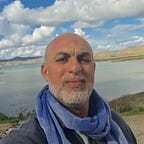Interpreter of Maladies
It’s not an aberration in America to find people working more than one job. In fact, a single occupation may only be enough to afford you a living but never the disposable income for life’s abundant luxuries. I have dabbled in many professions. A medical interpreter is one of the many hats that I wore. Hospitals have a dire need for an interpreter of maladies who is able to speak Moroccan darija. The Job is offered on a per diem basis and therefore you, as the interpreter reserves the right to decline any requests that you wish not to serve. Obviously, the flexibility this gig offers is very appealing and the pay is not too shabby either.
Several years ago, I was called to help interpret for a middle aged Moroccan lady. She was slated to undergo a minor surgery and her doctor needed my help convey to her every single boring detail about the pre operation protocol.
Right off the bat, I could tell that she was delighted to learn that I was also Moroccan. She confided in me that she was relieved that she was not assigned a Middle Easterner whose dialect is hard for her to decipher. I decided to add an extra layer of comfort and explain that I am also going to be her staunch advocate so that none of her rights are violated. Her eyes lit up and all the worries that seemed weighing her down were suddenly lifted.
The Doctor walked in, greeted both of us, and went straight to asking the same old questions. He verified her Identity confirmation, medications taken on a daily basis, changes since last visit, overall health condition, and safety at home. Yes, that last question is a routine one. Doctors are mandated by law to ask their patients if they are victims of domestic violence. Doctors and health care professionals are obligated to report to law enforcement such incidents of domestic abuse.
The patient was on the ball answering every question with ease except the one about her medications. I had asked her if she took her meds regularly as they were prescribed to her. She has answered positively but I detected a hint of stutter and hesitation. I was compelled to ask again just so no stone is left unturned. That time, however, she felt too relaxed to confide in me that she rarely takes those meds and that it all depends on the zeitgeist of the day. She was also very keen that the doctor doesn’t know about that. Without batting an eye lash, I told him verbatim what she just asked me to keep a secret. The doctor didn’t seem too phased by this as he was probably used to these scenarios. He suggested that lying about medications is often done at the detriment of patients and impedes the healing process. When I relayed that valuable word of wisdom in darija to the patient, she almost jumped off her seat. She couldn’t believe that I would rat her out to the doctor. “I thought you were on my side” she protested in disbelief. “I am… but I am also sworn to an oath that I can’t breach” I justified. She felt a little betrayed but I rationalized that her health is nothing to play around with.
The doctor was ready to wrap up the visit . He printed all relevant documents and asked me to have her sign and print her name where it’s indicated. She bowed her head down, fumbled the documents, and sheepishly confessed that she was analphabet. The look of guilt on her face tore me to shreds. I was heartbroken and devastated. I wanted to console her but didn’t know how to. I wanted to hug her and tell her that none of it was her fault. But I worried that grabbing a patient would violate the ethics of the job. I was emotionally confused. My coping mechanism was the spontaneous flow of tears. I wept uncontrollably into the palms of my hand in an effort to conceal it but the loud whimpers gave me away. Though he had every right to inquire, the doctor didn’t want to pry into what prompted me to sob. He patted my left shoulder and suggested to take a break. I kindly declined his offer and acted as stoic as one can under the circumstances. I instructed the patient to scribble anything on the dotted line. I then took the liberty to write her name where it says to print name.
The drive home from the hospital was about an hour. For the entire duration of the trip, I wondered again and again about why is nothing done about illiteracy. I lamented the dearth of policies put in place to assuage the effects of rural and adult illiteracy. I remember driving and bawling my eyes out. This was not just your average run of the mill weeping. Naaah, it was ugly crying where you can tell your snot from your spit. This was loud wailing that could only emanate from deep emotional distress. It was also pretty cathartic. It helped me release some heavy pent-up stress. But it did nothing to alleviate the enduring problem of illiteracy among adults and rural dwellers in Morocco
